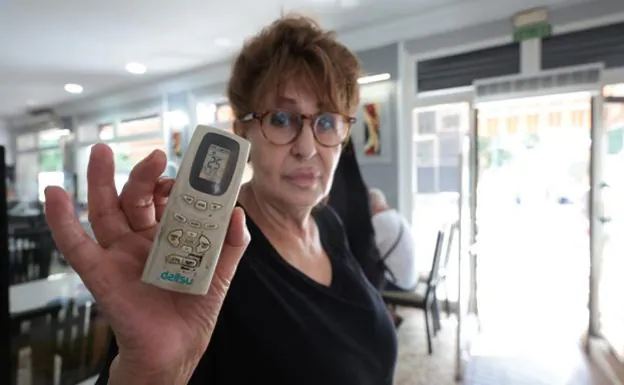
Confusion and quiet resignation on the street in first days of Spain's energy-saving rules
Shopkeepers have voiced criticism, resignation and doubts as the energy-saving law comes into force in Spain
The Gran Plaza bar is the epicentre of the La Paz neighbourhood in Malaga. Dozens, even hundreds, of people pass through the door of the bar from early in the morning. But on Wednesday, 10 August, there was something different that its regular customers pointed out as soon as they crossed the threshold: "It's hotter than usual", said one woman, waving a fan. Indeed, the air conditioning was a few degrees higher than usual at 25C, the minimum temperature now allowed in the bar and a figure that customers consider "too high".
The increased temperature is due to the Contingency and Savings Plan approved a week ago by the central government, which, among other measures, imposes restrictions on the use of lighting and air conditioning (and heating in winter) in all types of premises. These include public buildings, shops, department stores, public transport, theatres and hotels, which are obliged to limit air conditioning to a minimum temperature of 27C degrees and to do the same with heating, which may not exceed 19C, as long as they are not environments in which "light work" is carried out, where the limitation is somewhat more lax. Also, controversially, lights in shop windows and public buildings must be switched off from 10pm onwards.
The new energy saving law came into force on Wednesday, and in the first few hours the feeling of resignation and criticism was almost unanimous, despite the fact that not all businesses were complying with it to the letter. Gran Plaza owner Tere explained that she has had to spend almost 1,000 euros on an air curtain to save money. "I hope not to lose customers because of the heat", said the businesswoman, who regrets that it is "always the same people" who pay. In her case, she is concerned about what will happen with the requirement to have the door close automatically. "Waiters and customers are constantly coming and going. Here we are working flat out," the bar owner said.
Health and care centres, along with gyms and educational facilities, are exempt from the restrictions. The temperature limits will also not apply to planes, trains, buses and ships, although they will apply to transport terminals. And in museums it will depend on the temperature required to maintain the works on display.
Despite this information, not everyone is clear about it. Francisco works in a local clothes shop, Azahar Modas, and he doesn't know whether his shop has to be at 27C or 25C. “I'm certainly not sitting on a chair, and people come in here to try on clothes,” he said.
Invitation to PM
Mari Carmen, the owner of Modas Micaela, is convinced that the measure will hit her sales. “When people enter a fitting room and are faced with this heat, the last thing they will want to do is try on clothes,” she said
Maria, a customer who happens to be in the shop at the time, agrees as she wipes the sweat from her face. "I've gone downstairs to get a few things, but I'm going back upstairs with the air conditioning. I'm not comfortable trying on clothes like this," she said, while Mari Carmen shakes her head. "I don't know whose idea this was, we have too many ministers, too many councillors. I invite Pedro Sánchez to come and try on a suit in my fitting room. Let's see if he can hold out," Mari Carmen said.
In supermarkets, there are concerns that the measures could affect the optimum temperature of the food. Alfredo, a ham cutter at Jamones Salamanca, said. “The ideal temperature for hams is between 15C and 20C. If I have the shop at 25C or 27C, then logically it is not good for them,” he said, while stressing that they comply with all the regulations, including those of the automatic doors.
